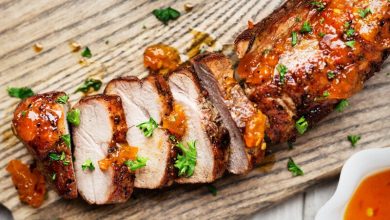A versatile all-around marinade is a flavorful mixture used to marinate various foods before cooking. While your profile mentions your interest in food and beverages, there’s no specific information provided about your preferences or experiences related to marinades. Nonetheless, I’ll provide you with the information you requested:
What is an All-Around Marinade?
An all-around marinade is a mixture of ingredients that is used to enhance the flavor and texture of various foods, particularly meats, seafood, and vegetables. It serves several purposes:
-
Flavor: Marinades infuse foods with a variety of flavors, including sweet, savory, spicy, and acidic notes, depending on the ingredients used.
-
Tenderness: Marinades often contain acidic components like vinegar or citrus juice, which can help break down tough fibers in meat and make it more tender.
-
Moisture: Marinades can add moisture to foods, preventing them from drying out during cooking.
History:
The history of marinades is long and diverse, with variations found in cultures around the world. Marinating food likely dates back to ancient times when people discovered that soaking meat or fish in liquids could improve its taste and tenderness. Specific marinade recipes and techniques have evolved over centuries, influenced by regional ingredients and culinary traditions.
Components of an All-Around Marinade:
The components of an all-around marinade can vary widely, but they typically include the following:
-
Acid: This can be vinegar, citrus juice (like lemon or lime), wine, or yogurt. The acid helps tenderize the food and adds a tangy flavor.
-
Oil: Olive oil, vegetable oil, or other types of oil provide richness and help carry the flavors of herbs and spices.
-
Herbs and Spices: Garlic, onions, herbs (such as rosemary, thyme, or cilantro), and spices (like paprika, cumin, or chili powder) contribute flavor and aroma.
-
Sweetener: Honey, maple syrup, brown sugar, or other sweeteners balance the acidity and add a touch of sweetness.
-
Salt and Pepper: These are essential for enhancing the overall taste of the marinade.
Steps to Prepare an All-Around Marinade:
Here’s a general outline of how to prepare an all-around marinade:
-
Choose Ingredients: Decide on the flavors you want to incorporate into your marinade based on your preferences and the dish you’re preparing.
-
Combine Ingredients: In a bowl, combine the acid (e.g., vinegar or citrus juice), oil, herbs, spices, sweetener, salt, and pepper. Mix well to create a balanced marinade.
-
Marinate: Place your food (e.g., chicken, beef, vegetables) in a container or a sealable bag and pour the marinade over it. Make sure the food is fully coated. Seal the container or bag.
-
Refrigerate: Marinate the food in the refrigerator for the desired amount of time. Marinating times can vary but usually range from 30 minutes to overnight, depending on the type of food. Be cautious not to over-marinate, as it can make the food mushy.
-
Cook: After marinating, remove the food from the container, allowing excess marinade to drip off. Cook the food as desired—grill, roast, bake, or sauté.
Time Needed to Prepare: The time needed to prepare an all-around marinade depends on your familiarity with the recipe and the ingredients you choose. Generally, it takes about 10-15 minutes to assemble the ingredients and mix the marinade. The marinating time can vary from 30 minutes to several hours or overnight.
Remember that the marinating time can significantly impact the flavor and tenderness of your dish, so plan accordingly based on your schedule and the results you desire.
Certainly, here are some general nutrition facts and health information related to using an all-around marinade:
Nutrition Facts:
-
The nutrition content of a dish prepared with an all-around marinade will vary depending on the specific ingredients used, such as the type of meat, vegetables, and the quantities of oil, sugar, and salt in the marinade.
-
The oil in marinades contributes to the overall calorie content of the dish. Olive oil, for example, contains healthy monounsaturated fats.
-
The use of sugar or sweeteners in the marinade can add calories and carbohydrates to the dish.
-
Marinades typically do not significantly affect the protein content of the food.
Health Information:
-
Marinades can enhance the flavor of lean proteins like chicken, fish, and tofu, making them more appealing and encouraging healthier eating.
-
Using fresh herbs and spices in marinades can provide antioxidants and other health benefits.
-
Be mindful of the quantity of oil used in the marinade, as it contributes to calorie content. Opt for healthier oils like olive oil and use them in moderation.
-
The acid in marinades (e.g., vinegar or citrus juice) can help tenderize meat and add a tangy flavor without excessive sodium.
-
It’s essential to watch the amount of salt (sodium) in your marinade, especially if you’re concerned about sodium intake. High-sodium marinades can contribute to increased sodium levels in your meal.
-
Marinating meats before grilling can reduce the formation of potentially harmful compounds, like heterocyclic amines (HCAs) and polycyclic aromatic hydrocarbons (PAHs), which are associated with grilled meats. The acidic components in marinades may help reduce the formation of these compounds.
-
Marinating vegetables and plant-based proteins can add flavor and make them more appealing, potentially encouraging a plant-based diet.
Remember that the specific health impact of your all-around marinade will depend on the ingredients and how you use it. To make your marinade as healthy as possible, choose fresh, whole ingredients, and be mindful of portion sizes and balance in your overall meal planning.



